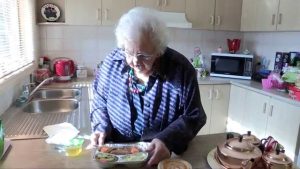Meals on wheels under threat as more councils drop service due to cuts
Just two years ago, two thirds of councils were offering a daily hot meal to help support older and disabled people in their own homes – an idea first put into practice more than 70 years ago.
The service is not protected by law, however, and is being dropped by growing numbers of authorities forced to focus only on their statutory responsibilities. Advocates for meals on wheels, however, say the trend is a false economy because it runs counter to the aim of keeping people living independently and out of hospital or costly residential care.
Neel Radia, who chairs the National Association of Care Catering (NACC), said: “This is a very worrying trend. Meals on wheels is so much more than just a meal – it’s a vital preventative service, and prevention is better than cure.â€
Meals on wheels were first provided during the second world war and are thought to have been started in Welwyn Garden City, Hertfordshire, in 1943 by the Women’s Voluntary Service (now Royal Voluntary Service). The service became a fixture of the post-war welfare state, but was never made a statutory entitlement. Today, councils that do deliver a two-course meal charge a subsidised rate averaging £4.30.
Research commissioned by the NACC for National Meals on Wheels Week this week, shows that only 48% of higher-tier authorities (county councils, unitary authorities, metropolitan authorities or London boroughs) across the UK are still “actively providing†a service, whether directly or through a contractor. In 2014, the proportion was 66%.
The research, by the Association for Public Service Excellence, a network that promotes council services, found provision varied, from 100% in Northern Ireland to 59% in Scotland, 45% in Wales and as little as 17% in the north of England and the south-east outside London.
According to the Malnutrition Task Force, an independent expert group, more than 1 million people aged 65 or over are malnourished or at risk of malnourishment, the vast majority of them living in the community.
Radia said home visits by a meals on wheels service not only helped counter malnutrition, but could include regular wellbeing and safety checks on often isolated householders. “It’s about looking out for people in our communities who have contributed throughout their lives – and doing it in a human and caring way,†he said.
Although councils that have dropped their meals on wheels service say they direct people to providers offering a private service, there is no subsidy. Apetito, a leading provider, charges £6.25 for a meal, including delivery.
Radia claimed that his organisation has in the past found examples of council websites directing people to fast-food outlets, which he says is appalling.
The sharp fall in the number of councils providing meals on wheels has alarmed Age UK. The charity said malnutrition spelled misery for the individual and piled costs on to the NHS.
“Meals on wheels can be a lifeline for many older people, making sure they have a regular meal and providing social contact for those who may be isolated or living alone – a hugely valuable indirect benefit,†said Caroline Abrahams, Age UK director. “Yet in too many areas this vital service has been cut to the bone as local authorities contend with huge cuts to their social care budgets.â€
The Local Government Association (LGA), representing councils in England, said the research findings reflected its deep concern at the consequences of steep cuts in government grants and a looming gap of at least £2.6bn in social care funding by the end of the decade.
Izzi Seccombe, who chairs the LGA’s community and wellbeing board, said: “Councils have long warned that the services that elderly and vulnerable people rely on, including meals on wheels, are coming under increasing threat. The government must use the autumn statement to provide councils with the funding to ensure we have a fair care system which goes beyond helping our loved ones to get washed, dressed and fed, but supports them to live dignified and independent lives.â€
